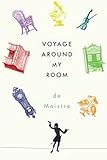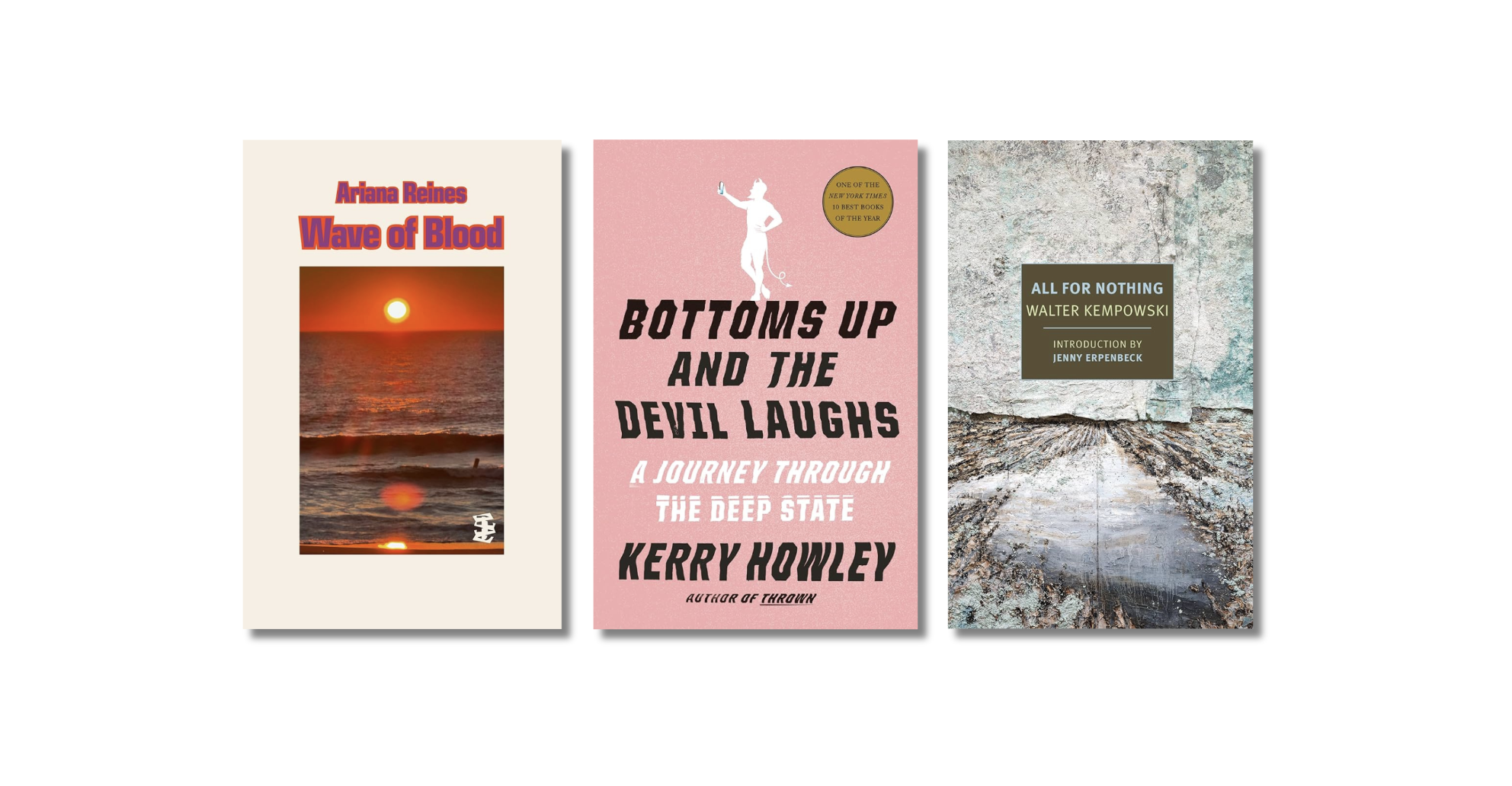“All of humanity’s problems stem from man’s inability to sit quietly in a room alone.”—Blaise Pascal
“What’s the point in going out? We’re just going to wind up back here anyway.”—Homer Simpson
The novel is perhaps the most housebound of all art forms. At both ends of its supply chain, there is a fairly strong imperative to stay put. There have always been writers who practice their profession in unusual locations, of course, just as a certain amount of reading is always going to be done on the move—on buses, on trains, on planes. But the literary exchange is, for the most part, a sedentary one. Writers tend to hold up their end of the deal by sitting at a desk and staying there until the book is written; readers tend to hold up theirs by sitting still, book in hand, until it is read. “The novel,” as Martin Amis once observed, “is all about not going out of the house.”
Between these two static real-world points, however, is almost always plotted a line of imaginary action. The form, in other words, tends to deal in stories, in narratives, in plots—which is to say that it concerns itself, by and large, with what happens when people do go out of the house. The great narratives are all about men and women going outside and having things happen to them. Odysseus would probably not have been worth talking about had he stayed in Ithaca pottering about the palace, just as his Twentieth-century reincarnation Leopold Bloom would probably not be nearly so great a character had he stayed put in his house on Eccles Street flipping through old issues of Titbits, admiring the cat, and making sure that no one came around to have sex with his wife. The story of Anna Karenina would have been a less tragic one had she stayed at home in St Petersburg reading novels and playing with young Seryozha, but then it might not have been worth Tolstoy’s time telling it. Even Christ himself would not have made much of an impact on the western imagination had he continued hanging out at his Galilee workshop focusing on his cabinet making.
Aristotle saw both tragedy and comedy as predicated on changes in the fortune of a character (and character was, for Aristotle, subordinate to action). In comedies, stuff happens that leaves characters better off at the end than they were at the beginning; in tragedies, stuff happens that leaves them worse off (often to the point of being dead). Either way stuff has to happen, and for this stuff to happen, the characters have to go out of the house. Pascal’s pensée about all humanity’s problems stemming from “man’s inability to sit quietly in a room alone” may well be right—or at least might have been before the advent of the Internet—but as practical advice it is of even less use for literature than it is for life.
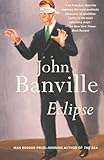
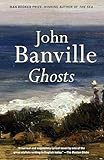 So the history of narrative fiction is, in a sense, a history of imagined action (poetry, of course, is another thing entirely). But there is a small but fascinating niche within that history, a sort of quiet backstreet in the vast, hustling metropolis of fiction, where nothing ever happens and no one ever goes anywhere. I developed a fascination with these books a couple of years back, when I was a graduate student writing a thesis on the work of the Irish novelist John Banville (himself a writer who could never be accused of excessive plotting). With a couple of Banville’s books, it seemed to me that he was getting away with an omission that would, in the work of most other writers, have been an outright deal-breaker: he was leaving out the plot. Novels like Ghosts and Eclipse struck me as being in some sense Banville’s purest and most honest work because of the way in which they all but did away with the artifice of plot, with the encumbrance of having things happen.
So the history of narrative fiction is, in a sense, a history of imagined action (poetry, of course, is another thing entirely). But there is a small but fascinating niche within that history, a sort of quiet backstreet in the vast, hustling metropolis of fiction, where nothing ever happens and no one ever goes anywhere. I developed a fascination with these books a couple of years back, when I was a graduate student writing a thesis on the work of the Irish novelist John Banville (himself a writer who could never be accused of excessive plotting). With a couple of Banville’s books, it seemed to me that he was getting away with an omission that would, in the work of most other writers, have been an outright deal-breaker: he was leaving out the plot. Novels like Ghosts and Eclipse struck me as being in some sense Banville’s purest and most honest work because of the way in which they all but did away with the artifice of plot, with the encumbrance of having things happen.
I went through a phase of seeking out books that effected this omission in increasingly extreme ways. It is probably no mere accident that this phase coincided with a period during which I was spending most of my own time at home alone, writing, reading—working or not working or, more often than not, some uneasy compound of both—and generally not going out of the house. My life felt radically plotless, devoid of incident to an almost avant garde extent. So I suppose I identified with shut-ins and hermits and layabouts in a way that I didn’t identify with characters who went out and did things, who became embroiled in plots and events. During this period, I came across a book called Voyage Around My Room by Xavier de Maistre, which seems to me to be the ur-text of this sub-genre. It is in fact not a novel at all, but a sort of anti-memoir or non-travelogue. The French aristocrat, military man and occasional author—whose older brother was the reactionary political philosopher Joseph de Maistre—wrote the book in 1790 while he was under house arrest in Turin for dueling. During the forty-two days in which he was confined to his rooms, he occupied himself by writing an idiosyncratic account of his inner life and his immediate surroundings. He begins with the following exhortation which, by managing to be at once relentlessly jocular and obscurely mournful, sets the tone for the rest of this peculiar little book:
Follow me, all you whom humiliation in love or neglect in friendship confines to your apartments, far from the pettiness and treachery of your fellow men. Let all the wretched, the sick, and the bored follow me—let all the lazy people of the world rise en masse;—and you, whose brain is aboil with sinister plans of reform; you, who in your boudoir are contemplating renouncing the world in order to live; gentle anchorites of an evening […] be so good as to accompany me on my voyage, we shall travel by short stages, laughing all along the way at travelers who have seen Rome and Paris.—Nothing shall stop us; and abandoning ourselves gaily to our fancy, we shall follow it wherever it wishes to take us.
It’s difficult, of course, and perhaps even misguided, to separate this strange anti-manifesto from its historical context. De Maistre was a French aristocrat living in Turin, and as he wrote these words his nation was undergoing a radical separation from its monarchist past which, for many members of the social class to which he belonged, entailed the even more radical separation of their heads from their bodies. A huge and violent historical narrative had led him to Turin; a small and violent personal narrative (something to do, I think, with a thwarted love affair that led to the duel) had led him to be placed under house arrest. During the time he was writing this book, his existence amounted to a confinement within an exile, to a compound displacement from the site of activity, of incident. To stay indoors is to ensure that nothing much happens to you. Not going out of the house, voluntarily or otherwise, is a way of forswearing plots of all sorts.
 As a kind of real-life patron saint of literary shut-ins—as the brother superior of ‘gentle anchorites’—de Maistre bequeaths a scattered legacy of plotless novels about staying in and not doing things. Perhaps the most celebrated of these is Ivan Goncharov’s 1859 novel Oblomov, in which the titular shiftless aristocrat spends much of the book avoiding getting out of his dressing gown and venturing forth from his St. Petersburg apartment. Oblomov’s entire existence is a repudiation of the very idea of activity, a protest against the pointlessness of motion. He is constantly baffled by his friends’ incomprehensible strivings after worldly success, romantic conquest and intellectual abstraction. Such pursuits lead too often to disaster. History itself is a grim repository of evidence for Oblomov’s stance (or, rather, recumbence). Reading history, Goncharov writes, “merely casts you into melancholy. You study and read that in such a year there were calamities and man was unhappy. He gathered all his forces, worked, rooted around, suffered terribly and labored, always preparing for brighter days. Now that they had come, you’d think that history itself would take a break, but no, again clouds gathered, again the edifice collapsed, again there was work and more rooting around. The brighter days didn’t linger, they raced by—and life kept flowing, always flowing, smashing everything as it went.”
As a kind of real-life patron saint of literary shut-ins—as the brother superior of ‘gentle anchorites’—de Maistre bequeaths a scattered legacy of plotless novels about staying in and not doing things. Perhaps the most celebrated of these is Ivan Goncharov’s 1859 novel Oblomov, in which the titular shiftless aristocrat spends much of the book avoiding getting out of his dressing gown and venturing forth from his St. Petersburg apartment. Oblomov’s entire existence is a repudiation of the very idea of activity, a protest against the pointlessness of motion. He is constantly baffled by his friends’ incomprehensible strivings after worldly success, romantic conquest and intellectual abstraction. Such pursuits lead too often to disaster. History itself is a grim repository of evidence for Oblomov’s stance (or, rather, recumbence). Reading history, Goncharov writes, “merely casts you into melancholy. You study and read that in such a year there were calamities and man was unhappy. He gathered all his forces, worked, rooted around, suffered terribly and labored, always preparing for brighter days. Now that they had come, you’d think that history itself would take a break, but no, again clouds gathered, again the edifice collapsed, again there was work and more rooting around. The brighter days didn’t linger, they raced by—and life kept flowing, always flowing, smashing everything as it went.”
Reading Oblomov doesn’t make a life spent in dressing gown and slippers seem appealing; despite his scrupulous avoidance of misery’s apparent causes, Oblomov is not an especially happy guy, and the novel is, as much as anything else, a satire against the shiftless entitlement of the serf-owning aristocracy. But it does make asking “what’s the point of it all?” seem more than just an excuse for apathy. Avoiding living is, of course, a perverse way of avoiding death. If life keeps “flowing, always flowing, smashing everything” as it rushes toward the ocean of death, the desire to scramble for the bank and sit the whole thing out on dry land is understandable, if ultimately self-defeating and futile.
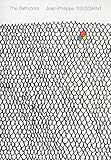
 The horrible, intransigent fact of the individual’s inevitable end seems to sit like a stone at the dead centre of many plotless novels. (Malone Dies, in which Malone lies naked in bed, and then dies, is maybe the most explicit example of this, and Beckett’s attraction to Goncharov’s novel is well documented—he occasionally signed his letters to his lover Peggy Guggenheim “Oblomov”). History is either a chaos or a plot, but both end, one way or another, in death. Although he only mentions it once in passing, it is by no means an inconsequential detail that the nameless narrator of Jean-Philippe Toussaint’s 1985 novella The Bathroom is a historian. This strange, impassively hilarious book presents the disjointed reflections of a young academic who decides to spend his time hanging out in the bathroom of the Paris flat he shares with his girlfriend. He lolls about in the empty bathtub, smoking cigarettes, listening to soccer matches on the radio, receiving the occasional visitor. He wants a life without movement, it seems, because movement itself is powerfully associated with the forward rushing momentum of time.
The horrible, intransigent fact of the individual’s inevitable end seems to sit like a stone at the dead centre of many plotless novels. (Malone Dies, in which Malone lies naked in bed, and then dies, is maybe the most explicit example of this, and Beckett’s attraction to Goncharov’s novel is well documented—he occasionally signed his letters to his lover Peggy Guggenheim “Oblomov”). History is either a chaos or a plot, but both end, one way or another, in death. Although he only mentions it once in passing, it is by no means an inconsequential detail that the nameless narrator of Jean-Philippe Toussaint’s 1985 novella The Bathroom is a historian. This strange, impassively hilarious book presents the disjointed reflections of a young academic who decides to spend his time hanging out in the bathroom of the Paris flat he shares with his girlfriend. He lolls about in the empty bathtub, smoking cigarettes, listening to soccer matches on the radio, receiving the occasional visitor. He wants a life without movement, it seems, because movement itself is powerfully associated with the forward rushing momentum of time.
Like Oblomov, he wants no part of the world. Looking out his window at one point, he watches people on the street fleeing a heavy rainfall, and imagines it as a “continuous downpour obliterating everything—annihilating everything.” But then he realizes that it not the “movements taking place before my eyes—rain, moving humans and automobiles” that fill him with dread but rather “the passing of time itself.” About a third of the way into the novel, the narrator abruptly and unaccountably leaves his flat and gets on a train to Venice. Once there, he promptly books into a shabby hotel which he then spends much of the remainder of the novella not going out of, essentially substituting a Parisian confinement for a Venetian one. Inactivity is his aim because it is, as he sees it, the ultimate aim of all activity, all movement. The “essential tendency of motion,” he tells us, “however lightning-swift it may appear, is toward immobility,” and “however slow it may sometimes seem, it is continuously drawing bodies toward death, which is immobility. Olé.” This is a bit like a more explicitly philosophical version of Homer Simpson’s questioning why Marge would want to go anywhere when “we’re just going to wind up back here anyway.”
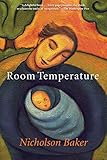
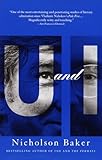 In U and I, his quasi-memoir about his long-standing obsession with John Updike, Nicholson Baker admits to feeling slightly restless as a reader when reaching that point in a novel when the author stops mucking about with description and atmospheric evocation and gets down to the serious business of plot. He takes issue with a remark of Updike’s about writers who “clog” their narratives with description. “The only thing I like are the clogs,” objects Baker, “—and when, late in most novels, there are no more in the pipeline to slow things down, I get that fidgety feeling.” Baker has gone on to make a career out of these bits: his novels are all clog and no narrative. The “plot” of Room Temperature—a great and funny book about not going out of the house—concerns a young father sitting in a rocking chair feeding his infant daughter warm milk from a bottle. Pretty much literally nothing happens; the closest we get to action is when the narrator exhales forcefully in the direction of a paper mobile hanging from the ceiling of the baby’s room, and the paper flutters around for a while. And here’s the thing: there’s not a dull moment in the book. Baker’s brilliance as a writer lies in his ability to make the (apparently) utterly trivial utterly compelling.
In U and I, his quasi-memoir about his long-standing obsession with John Updike, Nicholson Baker admits to feeling slightly restless as a reader when reaching that point in a novel when the author stops mucking about with description and atmospheric evocation and gets down to the serious business of plot. He takes issue with a remark of Updike’s about writers who “clog” their narratives with description. “The only thing I like are the clogs,” objects Baker, “—and when, late in most novels, there are no more in the pipeline to slow things down, I get that fidgety feeling.” Baker has gone on to make a career out of these bits: his novels are all clog and no narrative. The “plot” of Room Temperature—a great and funny book about not going out of the house—concerns a young father sitting in a rocking chair feeding his infant daughter warm milk from a bottle. Pretty much literally nothing happens; the closest we get to action is when the narrator exhales forcefully in the direction of a paper mobile hanging from the ceiling of the baby’s room, and the paper flutters around for a while. And here’s the thing: there’s not a dull moment in the book. Baker’s brilliance as a writer lies in his ability to make the (apparently) utterly trivial utterly compelling.
The attraction of plotlessness in fiction is less easy to account for than that of plotlessness in life. There is an awful lot to be said for a propulsive narrative—it is, after all, usually what keeps us turning the pages, what keeps us coming back to find out what happens next, how the characters develop, how it will all end. But when a writer manages to cut away all this artifice, leaving us with just the raw pulp of personhood, while still compelling us to read on, it is a fascinating trick to pull off. I don’t have much interest in the pronouncements of dinner party eschatologists like David Shields (the only appropriate reaction to someone announcing the death of the novel is to surreptitiously check your watch and mutter something about having an early start in the morning), but there is something undeniably compelling about a book that can do away with a thing as seemingly crucial as stuff happening.
Plots are mostly necessary. Writers need something for their characters to do, some reason for them to exist; they need some taut thread of narrative along which they can string their bright beads of observation and insight. Characters need to be kept busy so that we as readers don’t get bored with them, just as we as people tend to keep busy so that we don’t get bored with ourselves (and so that we can pay the rent). But as Oblomov asks of both the life of manic activity lived by one friend and the latest work of literary social realism championed by another, “where is the human being in this?” His own story provides an answer, of sorts, to his question. When you stay inside, when you opt out (or are kept out) of narratives and events—when you cease to be a character in a plot—what you are left with is, for better or worse, the person. The human being is right there: lying around in his dressing gown, or in his bathroom, or bottle-feeding his baby, dying alone, reading or writing. Doing whatever it is people do when they don’t go out of the house.
Image credit: Flickr/pinkmoose.

